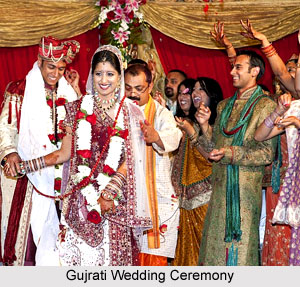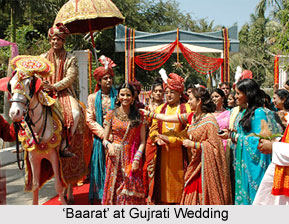 Gujrati marriages are full of symbolic rituals. These rituals lay down the terms of the marriage and give instructions to help the couple lead a good life. Gujratis believe that after marriage, the wife becomes her husband`s sahdharmacharini or equal. With marriage comes responsibility and power. In fact, it is the wife who must keep house and look after all the household requirements. Her husband must hand over to her the keys of the house. He is also expected to hand over his salary at the beginning of every month. The wife must follow her husband in his pursuit of a meaningful life.
Gujrati marriages are full of symbolic rituals. These rituals lay down the terms of the marriage and give instructions to help the couple lead a good life. Gujratis believe that after marriage, the wife becomes her husband`s sahdharmacharini or equal. With marriage comes responsibility and power. In fact, it is the wife who must keep house and look after all the household requirements. Her husband must hand over to her the keys of the house. He is also expected to hand over his salary at the beginning of every month. The wife must follow her husband in his pursuit of a meaningful life.
Pre Wedding Rituals
Mandap Mahurat: This ceremony is performed few days before the wedding at the house of the bride and the groom. This ceremony is undertaken at the outset of most auspicious events. The families pray to Lord Ganesh the to remove all obstacles and seek his divine blessing. An acharya or priest in front of a sacred fire performs the puja.
Griha Shanti: The puja for Griha Shanti is conducted with the family members and relatives of the bride as well as the groom. The purpose of the puja is to bring peace among the stars so that the couple can live a happy married life.
Pokavu: The actual wedding day begins with what is known as the Pokavu, the arrival of the groom. The mother-in-law at the entrance to the wedding hall greets him. A small ceremony is performed and then she tries to pinch the groom`s nose. This playfully reminds the groom that he has come to their door to ask for their daughter by rubbing his nose on the door.
Wedding Ceremony
Jaimala: In a Gujarati marriage ceremony the bride and groom exchange garlands twice. The first time the groom is placed higher than the bride and the second time on equal ground.

Madhuparka: During the "Madhuparka", the groom`s feet are washed and he is fed honey and milk. During this time, the bride`s sisters try and steal the groom`s shoes. At the end of the day the groom retrieves his shoes by offering his sister in-laws money.
Kanya Agaman: After the lighthearted ritual of Madhuparka her maternal uncle in a ceremony that is known as "Kanya Agamana" carries the bride to the Mandap. At this point, the "Antarpat", or the curtain separating the bride and groom, is lowered and the couple again exchanges garlands. The n the bride is given away to the groom in ritual known as "Kanya Daan" or "Hasta Milap".
Mangalpheras: Unlike all the other Hindu marriages, in Gujarati Marriage Ceremony phera`s are not taken seven times but it is taken four times. This ritual is called "Mangalpheras", when the couple circles the holy fire four times which symbolizes "Dharma", "Artha", "Karma" and "Moksha". The "Sapta Padi" is performed with a variation in which the groom helps the bride touch seven betel nuts with her right toe, while they recite the seven vows.
Post Wedding Rituals
After the departure of the bride and groom known as the "Vidai", the couple returns to the groom`s house where they play a game called "Aeki- Beki". Placing a ring and several coins in a tray filled with water, which is coloured, by "sindoor" and milk plays this game. It is said that the person who finds the ring four out of seven times, will rule the household.
More on Marriage System in Indian States
More on Indian Wedding Accessories
More on Indian Religious Weddings
More on Types of Marriages
See also
 Gujrati marriages are full of symbolic rituals. These rituals lay down the terms of the marriage and give instructions to help the couple lead a good life. Gujratis believe that after marriage, the wife becomes her husband`s sahdharmacharini or equal. With marriage comes responsibility and power. In fact, it is the wife who must keep house and look after all the household requirements. Her husband must hand over to her the keys of the house. He is also expected to hand over his salary at the beginning of every month. The wife must follow her husband in his pursuit of a meaningful life.
Gujrati marriages are full of symbolic rituals. These rituals lay down the terms of the marriage and give instructions to help the couple lead a good life. Gujratis believe that after marriage, the wife becomes her husband`s sahdharmacharini or equal. With marriage comes responsibility and power. In fact, it is the wife who must keep house and look after all the household requirements. Her husband must hand over to her the keys of the house. He is also expected to hand over his salary at the beginning of every month. The wife must follow her husband in his pursuit of a meaningful life.


















